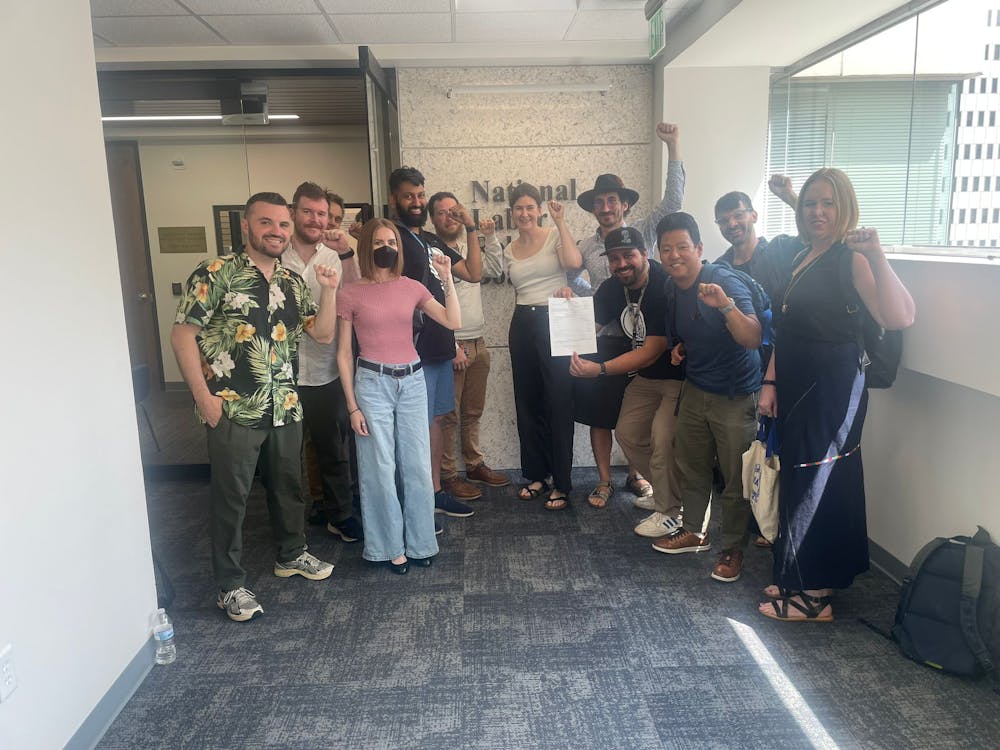On Monday, the Hopkins Emergency Response Organization (HERO) hosted CPR Awareness Day in line with National Collegiate CPR Day. Stationed on the Keyser Quad, this interactive event was designed to raise awareness and teach the skills required to perform “hands-only” CPR.
Members of HERO set up a blue tent along the walkway from 10 a.m. to 3 p.m., catching the attention and interest of passing students.
The group distributed information about CPR from the National Collegiate Emergency Medical Service Foundation by allowing students to practice on CPR mannequins. The chests of these mannequins were hollow and designed to dilate and inflate like a human chest when pressure is applied, thus simulating a real-life victim of cardiac arrest. 57 students took part in the event.
“Survival rates double if CPR is performed at the start of cardiac arrest,” sophomore Tommy Renner, a HERO crew chief and the organizer of the event, said.
Renner explained the idea behind the event in an email to The News-Letter.
“HERO put on CPR Awareness Day to educate as many people as possible on how easy Hands-only CPR is,” Renner wrote. “If you witness someone collapse and stop breathing normally, call for help, and compress the chest hard and fast until help arrives.”
A helpful hint HERO members gave students regarding the speed of compressions was to hum The Bee Gee’s “Stayin’ Alive” and press the chest according to the rhythm of the song.
Participants were trained in CPR but not officially certified.
A more detailed process is required to become officially certified in CPR, which includes instruction on how to perform rescue breathing. The full course is occasionally offered at the O’ Connor Recreation Center.
If nothing else, HERO hoped to communicate the idea that there is enough air in the chest upon the moment of cardiac arrest to resuscitate the victim with hands-only CPR. This information has been verified by the American Heart Association and is recommended for an “out of hospital” situation.
HERO also made a flash ad, which appeared on TV screen’s around campus and provided information about hands-only CPR.
Many Hopkins students on the Homewood campus are certified in CPR, including those who work as lifeguards, O’Connor Recreation Center staff, Outdoor Pursuits instructors and HERO members. However, according to Renner, there are still many other students who are not certified or have not been certified in a long time. Although many high schools across the country require students to learn CPR, students seldom renew the certifications in college.
Renner noticed that several people who claimed they were trained in CPR had trouble remembering the procedure perfectly. He was glad that these students got the chance to refresh their memory at the tent as well.
Even more people stopped by for information, and students who were already certified could take a test via the mannequins that gave them the chance to brush up on their training.
“We taught a wide range of people hands-only CPR, from five year-olds to professors,” Renner wrote.
HERO members even instructed young children in the basics of CPR, demonstrating its simplicity and accessibility. Renner hopes that their instructions will be easy to remember and to be performed on the spot.
“My favorite part of the day was seeing how interested people were in CPR,” he said. “I also liked how all the members of HERO came together and helped. We worked as a team as we always do.”
In addition to hosting this event, HERO also created a demonstration video in which a mock hands-only CPR situation occurs. The video was shared on Facebook and YouTube, and it received feedback from beyond the University.
“[The video] received over 270 shares on Facebook with over 2300 views,” Renner wrote. “We made the video originally to go around the campus to spread CPR Awareness. However, the video was shared by others and reached around the world. People were commenting to call 999 when they shared, while others said to call 112. Some wrote in Spanish, while others wrote in Chinese. I never thought that CPR Day at Hopkins would reach people across the globe. It’s amazing how powerful social media is in public health.”
Finally, HERO wanted to make sure that the Hopkins community was aware of just how accessible their service is. Some students may not realize that HERO’s phone number is listed on their J-Cards (410-516-7777). If a student needs medical assistance for themselves or another person, students can call HERO and expect them to arrive quickly as assistance. These situations can range from something severe like cardiac arrest to something like an ankle sprain. HERO can provide the important pre-hospital care if necessary, and is available around the clock.
After the CPR Awareness Day, HERO hopes that other students will be able to join them in providing basic quality medical care in emergency situations such as cardiac arrest.




